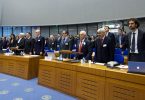Sovereign Immunity from Suit in the United States:
When Is a Government Subject to Suit Based on Its “Commercial Activities”?[1]
Markham Ball and Thomas J. Samuelian[2]
Foreign governments and government agencies that buy in the United States, or carry on other “commercial” activities here, need to know: if these activities give rise to claims against them, will the governments and their agencies be immune from suit in U.S. courts? Conversely, private parties in the United States that deal with foreign governments and entities owned by foreign governments need to know what their remedies are if things go wrong.
The answer to this question depends in many cases upon the scope of the “commercial activity” exception under the U.S. Foreign Sovereign Immunities Act. For nearly two decades United States courts have struggled to define the scope of this exception. Within the past year, the U.S. Supreme Court has addressed the exception twice — in Republic of Argentina v. Weltover[3] and Saudi Arabia v. Nelson.[4] Taken together, these decisions suggest that the “commercial activity” exception may be expanding, thereby exposing foreign sovereigns to more suits in the United States. The law remains in an uncertain state, however. With the law unclear, courts may be inclined, in the relatively small number of cases in which the U.S. State Department expresses a view, to give deference to the views of the Department on whether sovereign entities should be immune from suit under the circumstances of particular cases.
Background
Traditionally, the courts of one sovereign country, as a matter of comity and mutual deference, would not exercise jurisdiction over another sovereign.[5] Exceptions to this rule of deference have, however, long been recognized. For example, when a sovereign chooses to enter the marketplace and engage in commercial activities in the manner of a private actor, this deference largely disappears. The traditional rule and its exceptions were codified by the U.S. Congress in the Foreign Sovereign Immunities Act of 1976 (the FSIA).[6] The Supreme Court has interpreted the FSIA to be a comprehensive regulatory framework that provides the sole basis for jurisdiction over foreign states in U.S. courts.[7]
The so-called “commercial activity” exception is the most commonly invoked limitation on foreign sovereign immunity under the FSIA.[8] That exception provides a three-part test. A foreign state is not immune in any case “based upon”
(1) a commercial activity carried on in the United States by the foreign state;
(2) an act performed in the United States in connection with a commercial activity of the foreign state elsewhere; or
(3) an act outside the territory of the United States in connection with a commercial activity of the foreign state elsewhere, if that act causes a direct effect in the United States.
If any of these three tests is satisfied, the “commercial activity” exception applies, and sovereign immunity is lost.
The Weltover Case
In Republic of Argentina v. Weltover, 112 S. Ct. 2160 (1992), the U.S. Supreme Court gave an expansive reading to the third of these three tests.
The plaintiffs in that case were holders of securities issued by the Argentine government and payable in New York. The government rescheduled payment of these securities as part of an effort to stabilize the national economy. Certain security holders, all nationals of third countries, sought payment in the United States and, when payment was refused, sued in the United States for breach of contract. They relied on the third of the FSIA’s tests for commercial activity: they claimed that Argentina’s action outside the United States (its rescheduling of the debt) caused a direct effect (nonpayment) in the United States.
A unanimous Court agreed, and ruled against sovereign immunity for Argentina. The Court acknowledged that the government’s regulation of the national economy is a sovereign activity. However, under the terms of the FSIA it is the “nature,” not the “purpose,” of an activity that determines whether an act is “commercial.”[9] Disregarding the broader purpose of Argentina’s actions, the Court held that the issuance of securities was a commercial activity, such as might be engaged in by private parties.
This part of the Weltover holding broke little new ground. It has been generally accepted, for example, that buying shoes for the army is a commercial activity: although only a sovereign can maintain an army, anyone can buy shoes.
In another respect, however, Weltover is widely regarded as changing the law in a way that expands sovereign exposure to suit for commercial activities. The Court applied an unexpectedly broad test for determining whether an act outside the United States has a “direct effect” in the United States. The legislative history of the FSIA suggests that the direct effect must be both “foreseeable” and “substantial.”[10] The Supreme Court rejected these two requirements. Instead, under Weltover, an effect is “direct” if it is an “immediate consequence” of the sovereign’s activity that has more than a de minimis or “trivial” effect in the United States.[11] The denial of payment in New York was held to cause a sufficient “direct effect in the United States” to permit the security holders to sue Argentina in the United States.
In short, Weltover adopted a broad view of the “commercial activity” exception — first, by focusing on the “commercial” activity within a sovereign program as the basis for the plaintiffs’ claim; and, second, by easing the “direct effects” test to increase the likelihood that an act outside the United States would be deemed to have the necessary direct effect in the United States, even if that direct effect was unexpected.
The Nelson Case
In Saudi Arabia v. Nelson, 113 S. Ct. 1471 (1993), the Court defined the “activity” on which the plaintiffs claim was based in a similarly narrow fashion. However, where the Weltover Court found that the action was based on a commercial act that happened to be part of a sovereign program, the Nelson Court found that the claim was based on a sovereign act that happened to arise out of a commercial enterprise, and it held that Saudi Arabia was immune from suit.
In Nelson, the plaintiff, Scott Nelson, a U.S. citizen, was recruited in the United States by a U.S. corporation, Hospital Corporation of America (HCA), to work at a state-owned hospital in Saudi Arabia. Nelson alleged that he reported unsafe conditions at the hospital to his superiors, who retaliated by having him arrested, imprisoned, and tortured by the Saudi police.
Nelson sued Saudi Arabia in a U.S. federal court, under the first test of the FSIA commercial activity exception. His claims, he argued, were based upon a commercial activity (the staffing and running of a hospital) carried out by Saudi Arabia in the United States (as well as in Saudi Arabia). Nelson alleged two wrongs: first, physical abuse and imprisonment by the Saudi police at the instigation of his employer, the hospital; and, second, the allegedly negligent failure of the hospital’s recruiter in the United States to warn him of the dangers his employment would entail.
A divided Court ruled in favor of Saudi Arabia. A majority of six, in an opinion by Justice Souter, defined narrowly the “activity” on which Nelson’s first claim was based. The Court concluded that the claim was based only upon the jailing and beating, and not upon the commercial activities of running a hospital, recruiting employees, or managing personnel. Since “[e]xercise of the powers of police and penal officers is not the sort of action by which private parties can engage in commerce,” the Court held, Saudi Arabia was immune.[12] As in Weltover, the Court emphasized that it is the “nature” of the activity and not its “purpose” that determines whether the activity is commercial.
The case was not an easy one for the Court. In all, five separate opinions were required to express the differing views of the nine Justices on the various issues in the case. The concurring and dissenting opinions make it clear that the critical question — defining the “activity” on which a claim is based — admits of no easy or automatic answer.
Justices White and Blackmun, concurring in part, pointed out that the identical jailing and beating performed by “hired thugs” would hardly qualify as sovereign acts.[13] Thus, they said, the majority’s analysis relied primarily upon the nature of the actors, not the nature of the activity. Justices White and Blackmun took a broader view of the predicate activity than the majority did. From this broader view, they concluded that the claim was based, not simply upon the jailing and beating, but upon the commercial activity of running a hospital. However, they said, since the activity took place entirely in Saudi Arabia, the suit was barred because the first test of “commercial activity” (the only test Nelson relied on) applies only to “activity in the United States.”
Justice Stevens, dissenting, would have held that the claim was based upon a commercial activity that included the recruitment activities of Saudi Arabia’s agent in the United States. Hence, he concluded that the claim was based upon a commercial activity that had “substantial contact with the United States” and that, therefore, Saudi Arabia was not immune.
Although the majority’s narrow definition of the activity upon which Nelson’s claim was based served to preserve Saudi Arabia’s immunity in the Nelson case, in another respect the case may open the way to a lessening of immunity in future cases.
Nelson had also alleged that Saudi Arabia, through its contractor HCA, was negligent in failing to warn him of the risk of the dangers he might encounter in Saudi Arabia. Three Justices (Kennedy, Blackmun, and Stevens) were prepared to hold that, if these allegations were proved at trial, Saudi Arabia could lose its immunity on the basis of an activity carried out in the United States, not by Saudi Arabia or a Saudi governmental agency, but by an independent contractor acting on Saudi Arabia’s behalf.[14] The majority of the Court had no occasion to comment on this line of analysis. There seemed to be no dispute, however, that a foreign sovereign could lose its immunity because of the acts of a private company it hired in the United States. Indeed, the United States argued as amicus curiae in Nelson that “under familiar principles of agency law, a principal may be liable for the actions of an agent empowered to act on the principal’s behalf and under its control.” The court of appeals in Nelson had found that the contract between Saudi Arabia and HCA had “created an agency relationship.”[15]
The ruling has provoked a response in Congress. Since the Nelson ruling, members have made strong statements in the Congressional Record and introduced legislation to reverse the ruling (H.R. 2363)[16] Even before the ruling, a bill had been introduced to amend the FSIA (H.R. 934) to create a new exception to foreign sovereign immunity for cases involving torture or extrajudicial killing in a foreign state.[17] It remains to be seen where these legislative efforts will lead.
Do Weltover and Nelson Weaken the Sovereign Immunity Defense?
Both Weltover and Nelson adopted narrow definitions of the activities on which the claims against sovereigns were based in those cases. The result in Weltover was a holding that the claim was based on a commercial activity. In the unusual circumstances of Nelson, this narrow construction preserved Saudi Arabia’s immunity. Normally, however, the Weltover-Nelson approach to evaluating complaints is likely to put more activities in the “commercial” category. The component parts of most activities can be performed by sovereigns and commercial parties alike. Nelson suggests that sovereign immunity is more likely to be upheld when the acts complained of are carried on by regulatory, legislative, military, or police authorities, rather than private entities.
Both Weltover and the concurrences and dissent in Nelson teach that the commercial activities of a sovereign may cause immunity to be lost, even though these activities may have relatively little impact in the United States. The immunity may, in fact, be lost through the acts of agents and independent contractors in the United States. In light of this possibility, sovereigns that employ representatives in the United States would be well advised to define, in their contracts, precisely the extent to which commercial agents and other contractors are authorized to act and speak in the sovereign’s behalf. Commercial entities may wish to investigate carefully the extent of the authority of contractors that purport to act for sovereign entities.
Following the Lead of the Executive
Two other points may be noted. First, the results in each of the two cases discussed here were influenced by the way the plaintiffs pleaded their cases. The Weltover plaintiffs relied on the third test of commercial activity (commercial activity outside the U.S. having a direct effect in the U.S.). In Nelson, reliance was on the first test (commercial activity in the United States). Different pleadings would have required different analyses by the Court, and could conceivably have produced different outcomes.
Second, in both Weltover and Nelson, the Court adopted the arguments advanced by the United States in its briefs as amicus curiae.
One purpose of the Foreign Sovereign Immunities Act, when it was enacted in 1976, was to establish rules that would give the courts the capacity to decide, without assistance from the Executive, whether a particular activity was such as to warrant application of the doctrine of sovereign immunity. Under the pre-1976 practice, such decisions had been for the Executive alone to make.[18]
The Court’s acceptance of the views of the Executive (as formulated by the State Department) in these recent cases is noteworthy. It does not signal a return to the complete deference to the Executive that prevailed before 1976. It does, however, reflect the Court’s continuing interest in the views of the Executive. The Court remains extremely reluctant to take any action that could undercut the authority of the Executive in the area of international relations. Parties to suits between private parties and foreign sovereigns still stand to benefit from the support of the U.S. Department of State.
ENDNOTES
[1] Copyright 1993, Morgan, Lewis & Bockius. Reprinted with permission. All rights reserved.
[2] Mr. Ball is a partner and Mr. Samuelian is an associate in the Washington, D.C., office of the international law firm of Morgan, Lewis & Bockius.
[3] 112 S. Ct. 2160(1992).
[4] 113 S. Ct. 1471 (1993).
[5] Vie Schooner Exchange v. M’Faddon, 7 Cranch 116, 3 L. Ed. 287 (1812) (Marshall, C.J.); Verlinden B.V. v. Central Bank ofNigeria, 461 U.S. 480, 486 (1983).
[6] 28 U.S.C. § 1330; 28 U.S.C. § 1602 et seq.
[7] Verlinden, 461 U.S. 488, 496-97; Argentine Republic v. Amerada Hess Shipping Corp., 488 U.S. 428, 443 (1989).
[8] 28 U.S.C. 1605(a)(2).
[9] See Weltover, 112 S. Ct. at 2166 (interpreting dichotomy between nature and purpose of activity, under 28 U.S.C. § 1603(d)).
[10] H.R. Rep. No. 94-1487, 1976 U.S.S.C.A.N. 6604, 6618, citing Restatement (Second) of the Foreign Relations Law of the United States § 18 (1965); Weltover, 112 S. Ct. at 2168.
[11] Weltover, 112 S. Ct. at 2168.
[12] Nelson, 113 S. Ct. at 1480.
[13] Id. at 1482.
[14] Id. at 1485.
[15] Nelson v. Saudi Arabia, 923 F.2d 1528, 1533 (11th Cir. 1991).
[16] See, e.g., 139 Cong. Rec. H3373, E1444 (June 9, 1993) (statement of Rep. Schumer (N.Y.) in support of H.R. 2363, introduced that day by Rep. Pallone (N.J.)).
[17] See also The Torture Victims Protection Act of 1991, 28 U.S.C. § 1350 – Note, which applies to “state action”; i.e., individuals acting under authority, or color of law, of any foreign nation. The proposed law would provide a parallel cause of action against foreign states themselves; i.e., foreign governments, their agencies, and instrumentalities.
[18] Verlinden, 461 U.S. at 487; Alfred Dunhill of London. Inc. v. Cuba, 425 U.S. 682, 711 (1976) (describing pre-1976 Executive branch practice of deciding immunity issues on a case-by-case basis and communicating these decisions to the courts by a letter from the Department of State, known as a Tate Letter).





